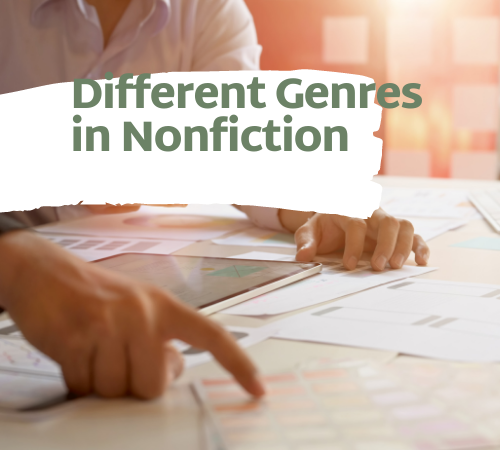“I do believe something very magical can happen when you read a good book.” -J.K. Rowling
Books have undeniably impacted one’s life- emotional, psychological, spiritual, etc. They change or challenge how we view things and stimulate us to be better individuals and understand some ideas or concepts that are beyond our capabilities. Books are our confidants in tough times. We can classify books into two types: fiction and nonfiction. The focus of this blog is to tackle the different genres of nonfiction.
What is Nonfiction?
Nonfiction is a type of book that embraces any works that are not based on a fictitious tale. Any media or document material aims to provide the truth and accuracy about facts, events, or individuals in good faith solely. The representation of nonfiction material may either be subjective or objective.
Nonfiction, which can take the form of a story, is a vital division of narrative writing (particularly prose). Compared to fiction, which presents information, characters, or events expected to be partially or entirely imaginary, or else leaves the open question of whether and how the work refers to reality.
Different Genres in Nonfiction
- History
It refers to a wide area of nonfiction literature that describes historical, real-life occurrences. It encompasses a diverse range of themes and narratives, including biographies of historical figures. Nonfiction writers are responsible for getting acquainted with famous nonfiction works and researching topics of interest to develop viable book ideas.
- Academic Publishing
Academic publishing is a sector of publishing that focuses on disseminating scholarly research and knowledge. The majority of academic work is published in the form of journal articles, books, or theses. Much, but not all, academic publishing is predicated on some peer review or editorial refereeing. Most established academic disciplines have their journals and other venues for publication. In contrast, many academic publications are relatively multidisciplinary in nature, publishing work from various unique subjects or subfields. The kind of publications recognized as additions to knowledge or study and the review and publishing procedures vary considerably across areas.
- Autobiography
A narrative of one’s life written by the author itself.
- Diary
Diary is mainly handwritten by the writer or author itself, a record of discrete entries organized that detail a day’s events chronologically. In addition, it contains a specific person’s thoughts, feelings, or experiences.
- Self-Help
This genre is also called self-improvement, a process of self-improvement in terms of one’s intellectual, emotional, or economic circumstances; some scientific or psychological basis supports it.
- Health/Fitness
It tackles different exercises and other activities to keep one’s body healthy and fit. In addition, it teaches individuals how to perform various exercises and prevent injuries.
- Guide and Manuals
A genre of nonfiction that focuses on particular abilities such as cookbooks, sports instruction, lessons for enthusiasts, and any other books involving how-tos of specific subject matters. For instance, travel guides are more instructional in nature, providing ideas and practical information to tourists heading to a particular location.
- Commentary and Humor
It is a condensed analysis and deliberation of real-life events through the lens of the author’s or writer’s perspective. Occasionally, the outlook is funny, political, or contemplative.
- Science
It is concerned with the systematic organization and presentation of information in the guise of testable explanations and universal predictions. Through experimentation and observation, these materials investigate the structure and behavior of the physical and natural world.
- Travelogues
It is a close relative of memoirs; it showcases the detail of an author’s or writer’s unique travel experiences.
- Biography
Also known as bio. It is a comprehensive account of one’s life. It encompasses more than basic facts about employment, education, death, and relationships; it also depicts an individual’s experience of these life events.
- Memoir
In a subcategory of autobiography, the author emphasizes particular moments or experiences that resulted in specific life lessons.
- Journalism
It refers to a broad subgenre of nonfiction that spans many media; newspapers, monthly journals, magazines, and television broadcasts. It reports on real occurrences that, in most cases, but not necessarily have current significance. Additionally, it may take the form of books. Finally, this category covers nonfiction narratives and true crime materials.
Are you looking for a literary agent? Handing your book to publishers is a daunting task. However, companies like Quantum Discovery can help you with your needs regarding having your book delivered to the right publisher. Contact our professionals by calling (888) 755-6875 or visit quantumdiscovery.net to know more.

Pingback: Differences Between Novella and Novel - Quantum Discovery